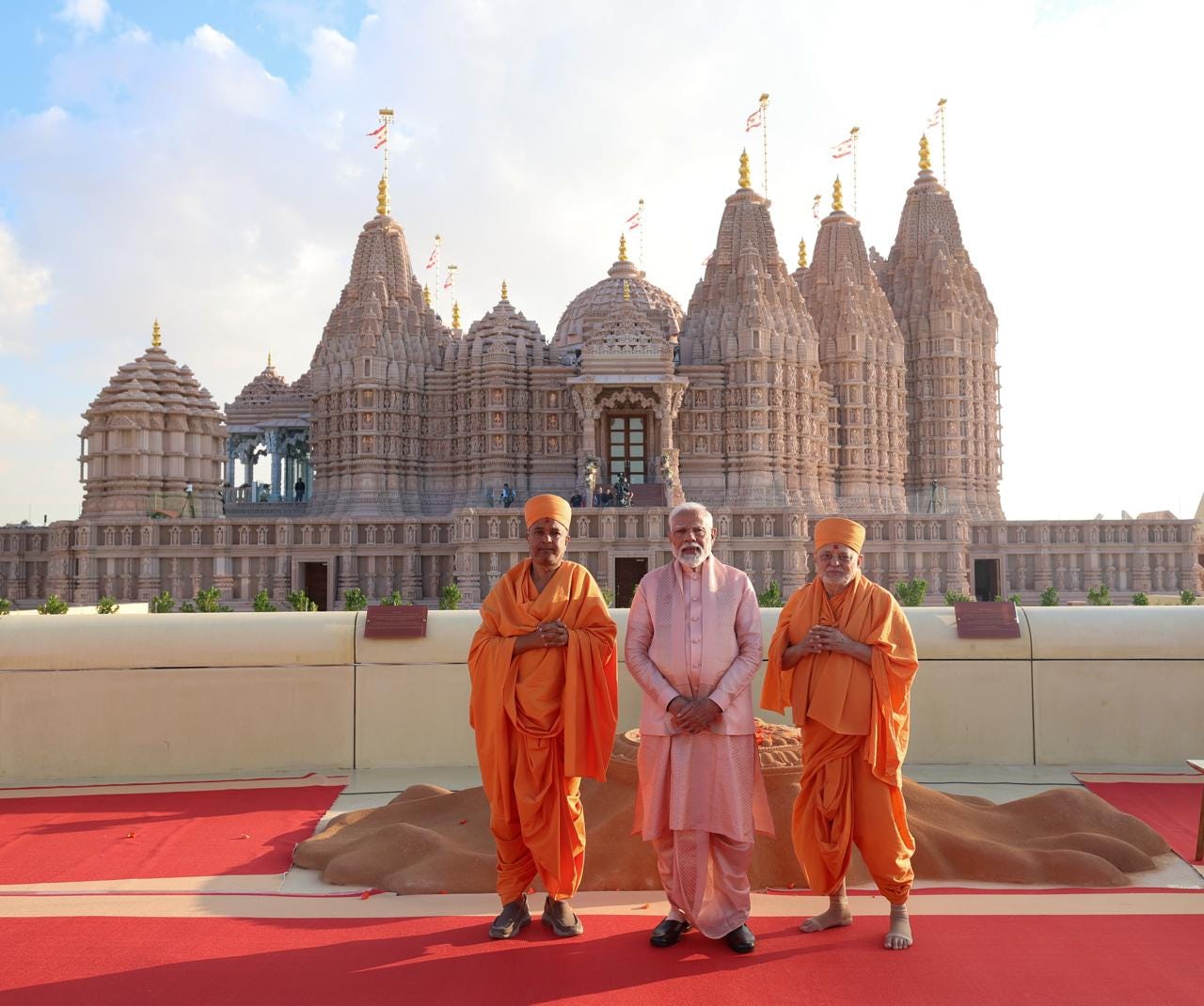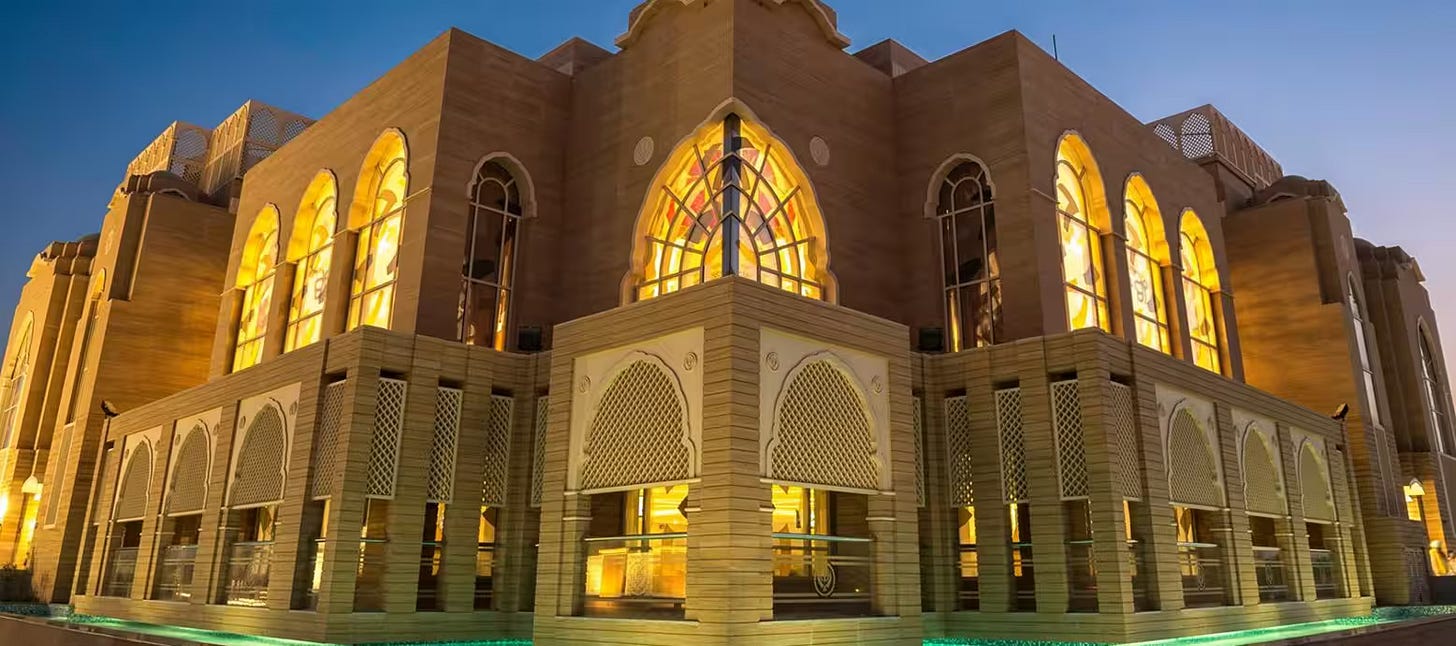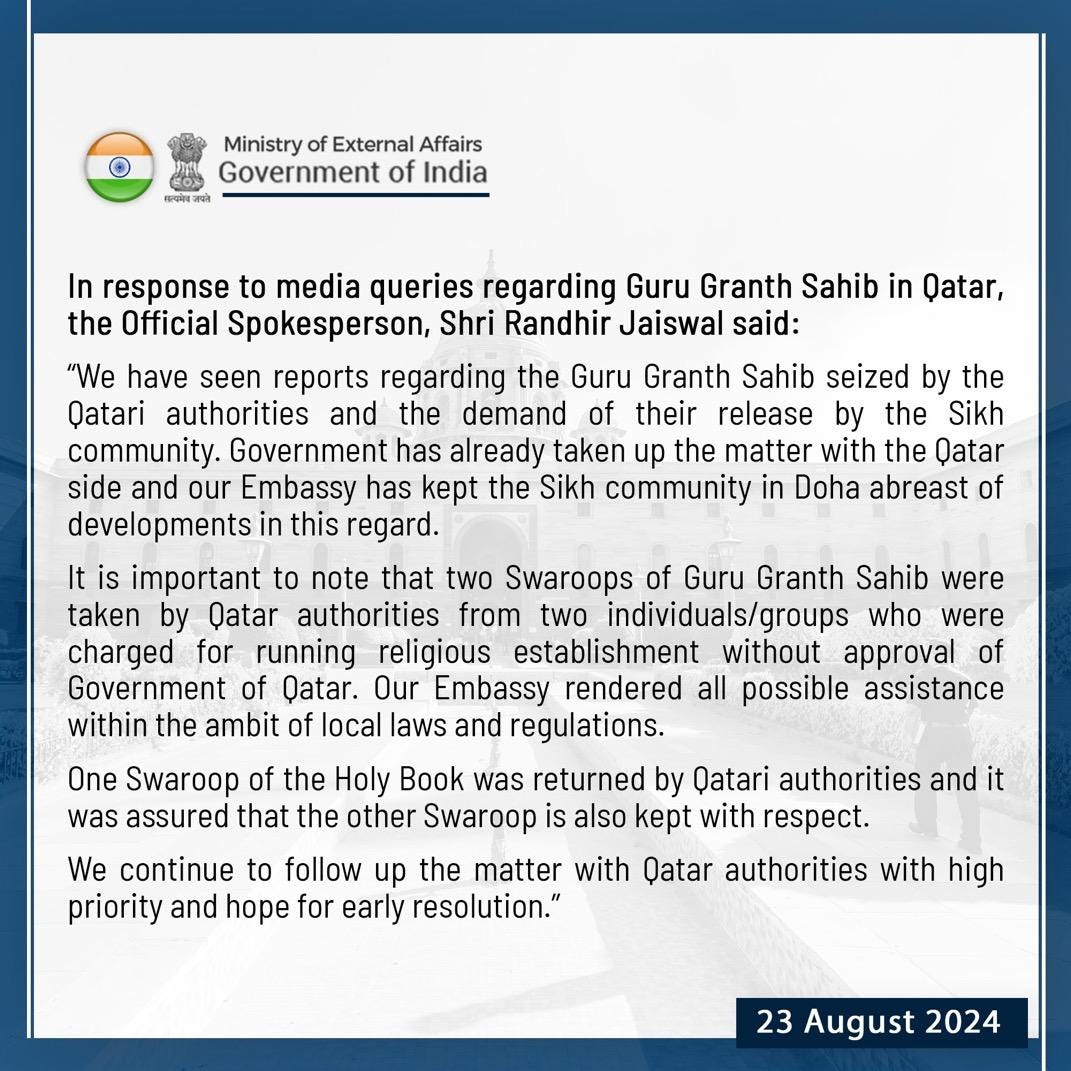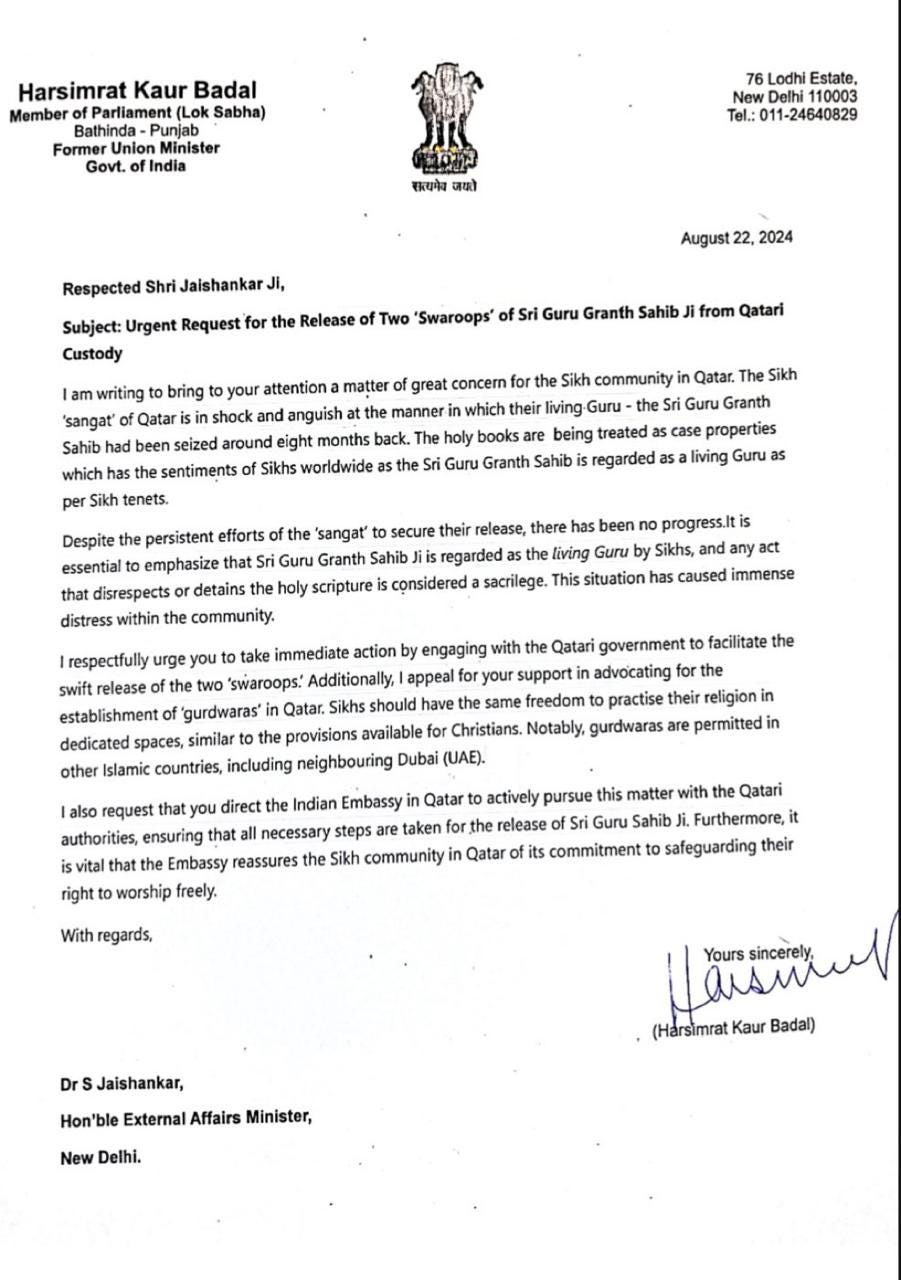Sri Guru Granth Sahib Incident in Qatar: The Sikh Sangat's Wake-Up Call
The Sikh Community Worldwide Expects Nothing Short of the Personal Intervention of Prime Minister Narendra Modi
Sri Guru Granth Sahib Incident in Qatar
The Sikh community in India and worldwide was jolted awake on the morning of August 23, 2024, by a disconcerting press release from the Ministry of External Affairs (MEA) of the Government of India. The statement, issued in response to media queries regarding the status of Guru Granth Sahib in Qatar, an oil-rich Islamic country in the Middle East, revealed a troubling situation that has since captured the attention of Sikhs across the globe.
Official Response from the Ministry of External Affairs
In a carefully worded statement, Randhir Jaiswal, the Official Spokesperson of the MEA, addressed the ongoing situation concerning the Guru Granth Sahib in Qatar. He acknowledged that two Swaroops (copies) of the Guru Granth Sahib had been seized by Qatari authorities from individuals or groups who were charged with running a religious establishment without the approval of the Qatari government.
The Indian Government, through its Embassy in Doha, had promptly intervened, offering all possible assistance within the framework of local laws and regulations. One of the Swaroops had already been returned, and it was assured that the other was being kept with the utmost respect. Jaiswal emphasized that the Indian government continues to engage with Qatari authorities to resolve the matter swiftly.
A Call for Greater Intervention
Reacting to this incident, I tweeted: "For the Sikh community worldwide, this is not a trivial matter. The Prime Minister Narendra Modi must throw his personal weight behind this case and request the Emir of Qatar to respectfully return the swaroop of Sri Guru Granth Sahib to an existing Gurdwara, within or outside Qatar" This tweet tagged the Honourable Prime Minister, Sardar Hardeep Singh Puri, Union Minister, and the Shiromani Gurdwara Parbandhak Committee (SGPC), among others, signalling the gravity of the situation and the need for higher-level intervention.
The sole Shiromani Akali Dal MP, Harsimrat Kaur Badal, also expressed her concern. She tweeted a copy of the demi-official letter she had written to the Minister of External Affairs, Dr. S. Jaishankar, urging him to take up the matter at the highest levels to ensure the safe and respectful return of the Guru Granth Sahib.
The Broader Context: Religious Freedom in Qatar
However, as the Sikh community, which regards Sri Guru Granth Sahib not merely as a sacred holy scripture but as the embodiment of the living Guru, waits for a resolution, a broader question looms—what is the status of religious freedom in Qatar? Specifically, what is the condition of Hindu temples, Sikh Gurdwaras, and Christian churches in this Islamic nation, which also hosts the largest U.S. Air Force base in the Middle East? This incident has sparked a deeper inquiry into the religious liberties and restrictions faced by non-Muslim communities in Qatar, raising concerns about how such incidents might affect interfaith harmony and religious freedom in the region.
We shall now explore these issues further, delving into the history and current status of religious establishments in Qatar.

Religious Freedom in Qatar: A Complex Landscape
As the Sikh community grapples with the situation involving Sri Guru Granth Sahib in Qatar, it’s crucial to understand the broader context of religious freedom in the country. Qatar's stance on non-Muslim places of worship is complex, evolving slowly over time, and varies significantly depending on the religious group in question.
Hindu Temples and Sikh Gurdwaras: The Absence of Official Recognition
Unlike some of its Gulf neighbours, Qatar does not currently have any officially recognized Hindu temples or Sikh gurdwaras. This absence stands in stark contrast to countries like the United Arab Emirates, Bahrain, and Oman, where Hindu temples have been established. For the large Hindu population in Qatar, which numbers around 422,118 people, or 15.9% of the total population, this lack of official places of worship is a significant point of contention.
Reports suggest that some Hindus in Qatar practice their faith privately, often setting up small worship spaces within their homes. Additionally, there are informal gathering places such as "Satsang Doha" and "Sal Bahadur Darai in Birkat Al Ahmar," which serve as unofficial Hindu temples. However, these spaces are not recognized or sanctioned by the Qatari Government, leaving the community without formal religious infrastructure.
For Sikhs, the situation is similar. The lack of an official gurdwara means that the community must navigate their religious practices within private or informal settings, a challenging circumstance for any religious group seeking to preserve its traditions and community bonds.
Christian Churches: A Restricted Yet Recognized Presence
Christian communities in Qatar fare somewhat better in terms of recognition, though their freedom is still heavily regulated. The Qatari Government does allow Christian churches to operate, but with significant restrictions. One notable development is the establishment of the Mesaymeer Religious Complex, also known as the Religious City, where several Christian denominations are housed. This complex represents the primary location for non-Muslim worship in Qatar and was recently expanded with permission granted to the Evangelical Church Alliance in Qatar (ECAQ) to build a church within its grounds.
While this is a positive step, the permission granted is still tightly controlled, and the Christian community must operate within the limits set by the state, which include restrictions on proselytization and the public display of religious symbols.
The US Air Force Base: A Non-Influential Factor in Religious Policy
Qatar is home to one of the largest US Air Force bases in the Middle East, Al Udeid Air Base, a critical strategic asset for the United States in the region. However, the presence of this base has not significantly influenced Qatar’s policies on religious freedom for its civilian population. The base primarily serves US military needs, and its existence does not translate into greater religious liberties or the establishment of non-Muslim places of worship in Qatar.
The Broader Picture of Religious Freedom in Qatar
Qatar’s approach to religious freedom is marked by a restrictive framework, deeply rooted in its adherence to Islamic law. The state religion is Islam, and all legal and societal structures revolve around this foundation. Non-Muslim religious groups that are officially recognized by the state, such as certain Christian denominations, are allowed limited freedom to practice their faith. However, for other religious minorities—Hindus, Sikhs, Baha'is, Jews, and atheists—religious practices are confined to private settings, often requiring permission from landlords to gather.
This regulatory environment highlights the challenges faced by non-Muslim communities in Qatar. The state’s slow progress in acknowledging and accommodating these groups reflects a broader struggle for religious freedom in the region, one that is unlikely to see rapid changes in the near future.
Summing Up: A Call for Greater Advocacy
The incident involving the Guru Granth Sahib in Qatar has brought to the forefront the broader issue of religious freedom in the country. While some progress has been made, particularly for Christian communities, the absence of officially recognized Hindu temples and Sikh gurdwaras underscores the limitations that remain. The Sikh community, alongside other religious minorities, continues to face significant challenges in practicing their faith openly and with state recognition.
A Call for Advocacy and Diplomatic Engagement
As we await a resolution to the Guru Granth Sahib situation, it is vital for the Indian government and the global Sikh community to continue advocating for greater religious freedom in Qatar—not just for Sikhs, but for all religious minorities. It is particularly striking that Qatar, a nation positioned as a leading mediator in the Israel, U.S., and Hamas peace talks, would impose such restrictive measures on the sacred scriptures of Hindus and Sikhs, both of which preach global brotherhood, world peace, and coexistence. The need for respectful dialogue and diplomatic engagement with Qatari authorities is crucial to ensuring that religious diversity is both acknowledged and protected in this Gulf nation. Prime Minister Narendra Modi must take the lead in persuading the Emir of Qatar to relax these archaic and restrictive practices, which have no place even in a modern Islamic state in today’s world.








I read it today and appreciate the concern. In my view, some influential Sikh businessmen should join hands and impress upon Qatar govt. for official permission to hold congregation. They may get help from Dubai gurdwara owner, SS Kandhari, who has his business connections in Middle east.
We Sikhs are, by culture, connected to weekly attendance at Gurudwara, listening to kirtan, hukamnama followed by langar. Sentiments attached to confiscation of Swaroops is fully understandable. Follow up by Sikhs for release also makes complete sense. However, what I see lacking here is an appeal to Sikhs that wherever we go, we should respect the local laws of the country. We go and work in countries which do not allow freedom of religion, out of choice, and are well aware of the laws. We should not break those laws. I know few of our Sikh brothers who live in Riyadh, Dammam in KSA, and they come to Baharain to visit Gurudwara Sahab at Salamabad there. I think SGPC and Sikh scholars should appeal to all Sikhs to abide by the local laws.